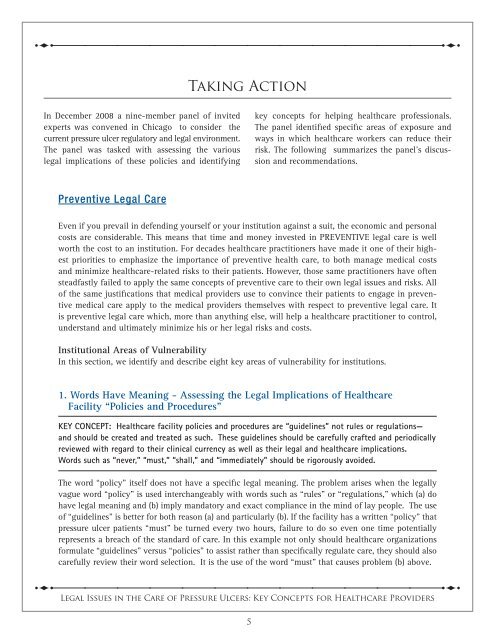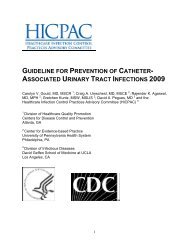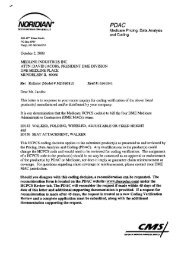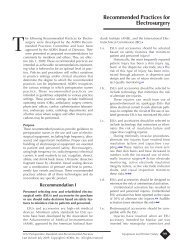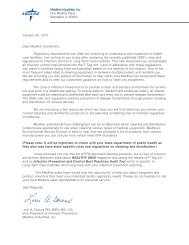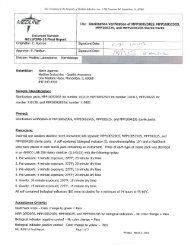sttttttttttttsLitigation: It’s PersonalHealthcare workers attracted to <strong>the</strong> <strong>in</strong>dustry for altruisticreasons may f<strong>in</strong>d <strong>in</strong>clusion <strong>in</strong> litigation to be adevastat<strong>in</strong>g and completely unexpected development.As already discussed, patients and <strong>the</strong>ir family membersmay engage <strong>in</strong> litigation primarily for <strong>the</strong> purpose<strong>of</strong> ga<strong>in</strong><strong>in</strong>g answers to questions, and may perceive that<strong>the</strong>y are su<strong>in</strong>g <strong>in</strong>stitutions ra<strong>the</strong>r than people. However,it gets personal when <strong>the</strong> <strong>in</strong>dividuals with<strong>in</strong> <strong>in</strong>stitutionsare deposed and perhaps may have to testify <strong>in</strong>court. (See “Deposed: A Personal Perspective.”) Cl<strong>in</strong>iciansmay even have <strong>the</strong> embarrass<strong>in</strong>g experience <strong>of</strong> be<strong>in</strong>gpublicly served with a subpoena by an armed lawenforcement <strong>of</strong>ficer at <strong>the</strong>ir place <strong>of</strong> bus<strong>in</strong>ess or home.The petition filed by <strong>the</strong> pla<strong>in</strong>tiff states <strong>the</strong> way <strong>in</strong>which <strong>in</strong>dividuals were specifically negligent <strong>in</strong> <strong>the</strong>ircare <strong>of</strong> <strong>the</strong> patient. For example, pla<strong>in</strong>tiffs may namespecific non-physician healthcare workers (<strong>in</strong>clud<strong>in</strong>gadm<strong>in</strong>istrators). Even though <strong>the</strong>y may be employees<strong>of</strong> <strong>the</strong> <strong>in</strong>stitutions, <strong>the</strong>y are still <strong>in</strong>dividually liable.However, <strong>the</strong>ir employer (<strong>the</strong> <strong>in</strong>stitution) is vicariouslyliable for <strong>the</strong>ir conduct as well. What this means isthat monetary damages can be recovered from <strong>the</strong><strong>in</strong>stitution. In many cases <strong>the</strong>re is no attempt to seize<strong>the</strong> f<strong>in</strong>ancial assets <strong>of</strong> healthcare pr<strong>of</strong>essionals because<strong>the</strong>ir employer is an easier target for recover<strong>in</strong>gdamages. It is naive, however, to believe that healthcarepr<strong>of</strong>essionals face no substantial risk when named<strong>in</strong> a lawsuit. They not only experience f<strong>in</strong>ancialexposure, but also <strong>the</strong> risk <strong>of</strong> los<strong>in</strong>g <strong>the</strong>ir pr<strong>of</strong>essionallicense. This is especially true for consultants who arenot employed by <strong>the</strong> <strong>in</strong>stitution.Litigation becomes a very personal experience for anyhealthcare workers named <strong>in</strong> a suit, even if no personalassets are at stake. When personal assets are at stake,<strong>the</strong>y could <strong>in</strong>clude cars, jewelry, bank accounts, etc. Forall healthcare workers whose personal assets are at risk,<strong>the</strong> threat <strong>of</strong> litigation may dictate <strong>the</strong> manner <strong>in</strong> whichall personal property is handled throughout <strong>the</strong>ir pr<strong>of</strong>essionallives. This is an especially common issue forphysicians. Involvement <strong>in</strong> litigation can be sufficientlytraumatic to cause some healthcare workers to leave <strong>the</strong><strong>in</strong>dustry, even when <strong>the</strong> outcome <strong>of</strong> litigation is favorable.Do <strong>the</strong> Math: The Economic Impact <strong>of</strong> LitigationIt is perceived that <strong>the</strong> economic impact <strong>of</strong> litigationis only due to f<strong>in</strong>ancial settlements or judgments.However, once a suit is filed, <strong>the</strong> economic impactbeg<strong>in</strong>s immediately. Prepar<strong>in</strong>g for litigation is timeconsum<strong>in</strong>g,as old medical records and backgroundmaterials must be reviewed. Meet<strong>in</strong>gs with legalcounsel, depositions or testimony at trial may allrequire tak<strong>in</strong>g time away from patient care. The averagecase takes more than two years to resolve if ajury trial is necessary. This means cl<strong>in</strong>icians whohave moved on to new job opportunities maycont<strong>in</strong>ue to be <strong>in</strong>volved with legal proceed<strong>in</strong>gs.Independent practitioners must report all suits <strong>in</strong>which <strong>the</strong>y were named regardless <strong>of</strong> <strong>the</strong> outcome —for <strong>the</strong> duration <strong>of</strong> <strong>the</strong>ir career. National report<strong>in</strong>g<strong>in</strong>itiatives make all judgments public <strong>in</strong>formation.This means for many cl<strong>in</strong>icians a law suit isnever “over.” Settlement amounts are generally or<strong>of</strong>ten confidential. They are <strong>the</strong>refore, once aga<strong>in</strong>,generally or typically not publicly available.Subpoena—A written order issued by <strong>the</strong> government which requires <strong>the</strong> recipient to ei<strong>the</strong>r testify or produce some k<strong>in</strong>d <strong>of</strong>physical evidence. Failure to comply with a subpoena may result <strong>in</strong> punishment. If you are called to be a witness <strong>in</strong> alawsuit, you may be served a subpoena. Pla<strong>in</strong>tiff—The pla<strong>in</strong>tiff is <strong>the</strong> party br<strong>in</strong>g<strong>in</strong>g <strong>the</strong> compla<strong>in</strong>t or <strong>in</strong>itiat<strong>in</strong>g <strong>the</strong> litigation.If a patient sues you for malpractice, <strong>the</strong> patient is <strong>the</strong> pla<strong>in</strong>tiff. Counsel—<strong>Legal</strong> representation, that is, an attorney.sttttttttttttsDeposition—Witness testimony given under oath and recorded for use at a later date.<strong>Legal</strong> <strong>Issues</strong> <strong>in</strong> <strong>the</strong> <strong>Care</strong> <strong>of</strong> <strong>Pressure</strong> <strong>Ulcer</strong>s: Key Concepts for Healthcare Providers4
sttttttttttttsTak<strong>in</strong>g ActionIn December 2008 a n<strong>in</strong>e-member panel <strong>of</strong> <strong>in</strong>vitedexperts was convened <strong>in</strong> Chicago to consider <strong>the</strong>current pressure ulcer regulatory and legal environment.The panel was tasked with assess<strong>in</strong>g <strong>the</strong> variouslegal implications <strong>of</strong> <strong>the</strong>se policies and identify<strong>in</strong>gkey concepts for help<strong>in</strong>g healthcare pr<strong>of</strong>essionals.The panel identified specific areas <strong>of</strong> exposure andways <strong>in</strong> which healthcare workers can reduce <strong>the</strong>irrisk. The follow<strong>in</strong>g summarizes <strong>the</strong> panel’s discussionand recommendations.Preventive <strong>Legal</strong> <strong>Care</strong>Even if you prevail <strong>in</strong> defend<strong>in</strong>g yourself or your <strong>in</strong>stitution aga<strong>in</strong>st a suit, <strong>the</strong> economic and personalcosts are considerable. This means that time and money <strong>in</strong>vested <strong>in</strong> PREVENTIVE legal care is wellworth <strong>the</strong> cost to an <strong>in</strong>stitution. For decades healthcare practitioners have made it one <strong>of</strong> <strong>the</strong>ir highestpriorities to emphasize <strong>the</strong> importance <strong>of</strong> preventive health care, to both manage medical costsand m<strong>in</strong>imize healthcare-related risks to <strong>the</strong>ir patients. However, those same practitioners have <strong>of</strong>tensteadfastly failed to apply <strong>the</strong> same concepts <strong>of</strong> preventive care to <strong>the</strong>ir own legal issues and risks. All<strong>of</strong> <strong>the</strong> same justifications that medical providers use to conv<strong>in</strong>ce <strong>the</strong>ir patients to engage <strong>in</strong> preventivemedical care apply to <strong>the</strong> medical providers <strong>the</strong>mselves with respect to preventive legal care. Itis preventive legal care which, more than anyth<strong>in</strong>g else, will help a healthcare practitioner to control,understand and ultimately m<strong>in</strong>imize his or her legal risks and costs.Institutional Areas <strong>of</strong> VulnerabilityIn this section, we identify and describe eight key areas <strong>of</strong> vulnerability for <strong>in</strong>stitutions.1. Words Have Mean<strong>in</strong>g - Assess<strong>in</strong>g <strong>the</strong> <strong>Legal</strong> Implications <strong>of</strong> HealthcareFacility “Policies and Procedures”Key Concept: Healthcare facility policies and procedures are “guidel<strong>in</strong>es” not rules or regulations—and should be created and treated as such. These guidel<strong>in</strong>es should be carefully crafted and periodicallyreviewed with regard to <strong>the</strong>ir cl<strong>in</strong>ical currency as well as <strong>the</strong>ir legal and healthcare implications.Words such as “never,” “must,” “shall,” and “immediately” should be rigorously avoided.The word “policy” itself does not have a specific legal mean<strong>in</strong>g. The problem arises when <strong>the</strong> legallyvague word “policy” is used <strong>in</strong>terchangeably with words such as “rules” or “regulations,” which (a) dohave legal mean<strong>in</strong>g and (b) imply mandatory and exact compliance <strong>in</strong> <strong>the</strong> m<strong>in</strong>d <strong>of</strong> lay people. The use<strong>of</strong> “guidel<strong>in</strong>es” is better for both reason (a) and particularly (b). If <strong>the</strong> facility has a written “policy” thatpressure ulcer patients “must” be turned every two hours, failure to do so even one time potentiallyrepresents a breach <strong>of</strong> <strong>the</strong> standard <strong>of</strong> care. In this example not only should healthcare organizationsformulate “guidel<strong>in</strong>es” versus “policies” to assist ra<strong>the</strong>r than specifically regulate care, <strong>the</strong>y should alsocarefully review <strong>the</strong>ir word selection. It is <strong>the</strong> use <strong>of</strong> <strong>the</strong> word “must” that causes problem (b) above.stttttttttttts<strong>Legal</strong> <strong>Issues</strong> <strong>in</strong> <strong>the</strong> <strong>Care</strong> <strong>of</strong> <strong>Pressure</strong> <strong>Ulcer</strong>s: Key Concepts for Healthcare Providers5


